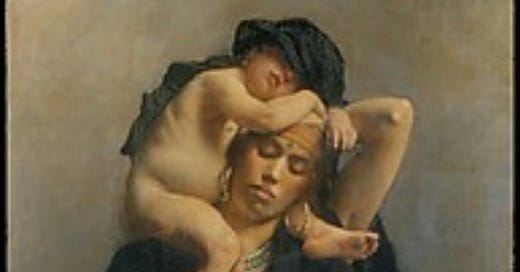To Reconcile the Feral and the Domestic
Using our mammal bodies to meld motherhood and the material
Today I am sharing an essay of mine that was published over at
, entitled “Domestic, Not Domesticated”. An ongoing obsession of mine is the exploration of how to instill the more feral aspects of female human nature into the domestic spheres we both inhabit and curate. I am continually compelled to reconcile these two realities—the more mammalian, physiological aspects of womanhood and which informs the human spirit—and the responsibilities of day to day life as a mother and community member, as well as the inherent beauty that lies in order. The thing which connects the two seems to be, what is for me, my most basic and obvious impulse—the creation impulse.To elaborate a bit, I state in the essay the following:
“The philosopher Edith Stein said: ‘The world doesn’t need what women have, the world needs what women are.’
For most women, motherhood represents a deep-seated, biological desire. While we are beings with souls, ambitions, and egos, we are also, and fundamentally, mammals. Harmoniously reconciling our human consciousness with our instinct for a family is the mission.
….
The excitement that comes with creating is life-giving for our spirit. The creative process is how we take the nebulous and forge it in the material. This means that caring for our domestic context can bring us a sense of fulfillment when combined with our desire to contribute to the world. Using our physical selves to make and curate the spaces around us and transform them to create a sense of wonder, beauty, and comfort is what Stein meant by ‘what women are.’ Women are makers of the vast infinite turned material.”
Read the rest at the link below (please share and comment if so inclined!):
An Egyptian Peasant Woman and Her Child, Léon Bonnat
I also wanted to include a few other links to some recently published pieces I enjoyed from
here, as they are all worth reading!From editor
, on AI:“At a gut level, does the AI-created art feel as full of life as a Caravaggio painting? Perhaps we can’t put our finger on why, but it’s clear to anyone who observes closely the different feelings the painting by Caravaggio evokes. Emotions transpire through our work. When we are spectators of great art, we sense a wonder that cannot be articulated through reason—it speaks to our most primitive understanding of what it means to be human and attempt to create a glimpse of the divine through our work.”
From
, on sickly subversive social media patterns surrounding fatherhood:“A common belief among some online culture warriors is that men who are responsible for wives and children are risk avoidant. This half-truth is twisted to rationalize their belief. While I, as a husband and family man, may be less likely to purchase a motorcycle for riding on busy highways without a helmet, I am much more likely to take any risk to protect and provide a better future for my wife and children, and therefore, society as a whole.
Such is a common truth; we are not required to look very far in history to see it proved. When the Founding Fathers of the United States signed the Declaration of Independence, an act which immediately made them guilty of treason against Great Britain, promising execution once apprehended by the Crown, many of the signatories had wives and young children. It was the most significant risk they could have taken and it was a selfless one. They did not use their families’ safety as an excuse to avoid this act, as understandable as that would have been.”
And
on the meaning and importance of play:“So how do we get back to a culture that is light enough to risk flirting? That finds fun and pleasure in taking the time just to see where a conversation or a flirtation leads? Huizinga suggests that, perhaps surprisingly, there is an affinity between play and order, and has a tendency “to be beautiful”. All play has rules, even if these change as the game goes along. One must demonstrate a certain openness and willingness to go along with what may come, to be, as it were “game”. Games are also intimately connected with secrecy—the exact opposite of the relentless imposition of transparency central to the surveillance, and self-surveillance, age.”
Thank you all, as usual.







Another lovely post Emily. I regard being a woman as a privilege because of my ability to create new life, which is unique to mammalian females. And I think that breastfeeding our babies is the perfect example of melding motherhood and the material world. "The mystical territory mothers enter when breastfeeding is ancient. It is primal. It is experiential." https://lucyleader.substack.com/p/the-missing-piece